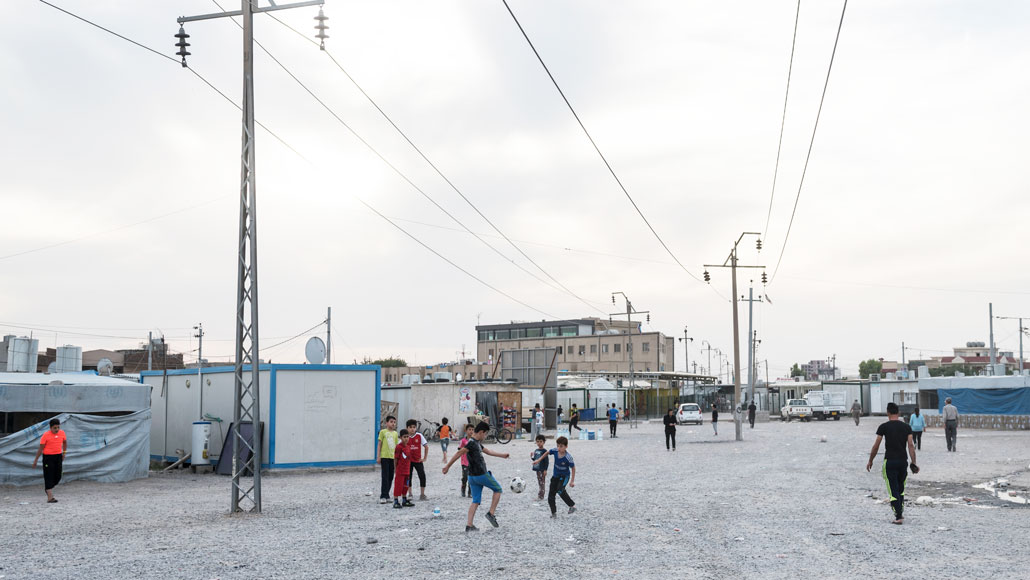Interfaith soccer teams eased Muslim-Christian tensions — to a point
A study in Iraq shows the benefits and limitations of social cohesion interventions

Christian children displaced by the Islamic State play soccer in Ankawa, Iraq, in 2017. A political scientist tested whether putting adult Christians and Muslims on the same soccer teams could help the communities reconcile after ISIS forced Christians and other minorities to flee parts of northern Iraq in 2014.
Joel Carillet/iStock/Getty Images Plus
Bringing rival groups together to reduce prejudices is not a new idea. But can positive contact help ethnic groups reconcile after extreme violence? A social scientist tested that idea in Iraq by putting Christians and Muslims on the same soccer teams. The resulting camaraderie among players did help bridge those communities — but only to a point.
Relations between Muslims and Christians disintegrated in northern Iraq after the Islamic State took over Mosul and surrounding regions in 2014. Some 100,000 Christians from Mosul alone were among those who fled their homes, returning years later to live uneasily alongside Muslim residents who they saw as complicit in the attacks. Political scientist Salma Mousa of Stanford University, an avid soccer fan who grew up in the Middle East, wondered if the popular sport could bring those communities together.
Players did make small behavioral changes on the field, but that didn’t translate to broader attitudinal shifts.
For instance, at the end of the two-month league, roughly 61 percent of Christian players on mixed teams agreed to register for mixed teams the following season, compared with 47 percent of players on all-Christian teams, Mousa reports in the Aug. 14 Science. Almost 54 percent of Christian players on mixed teams voted for a Muslim newcomer to win a sportsmanship award, given to a person not on their own team, compared with about 31 percent of players on all-Christian teams. And when researchers contacted players six months later, about 61 percent of Christian players from mixed teams were training with Muslim players at least once a week compared with 17 percent of players from the all-Christian teams.
But Mousa did not find that sort of interethnic camaraderie off the field. For instance, even after being given an $8 voucher to a Muslim-owned restaurant in Mosul, Christian players from mixed teams weren’t any more likely than players from segregated teams to make the 40-minute drive. Nor did these Christian players’ attitudes toward Muslims in general change much on surveys taken at the start and culmination of the league.
“I was hoping … contact would solve everything,” Mousa says. “At first I was disappointed, but then I actually started to think it is a win to even have this positive dent” in improving relations between the groups.
Mousa’s research hinges on the “contact hypothesis,” the idea that positive interactions among rival group members can reduce prejudices. That idea underlies many global peacekeeping efforts, with the U.S. Agency for International Development allocating $877 million in 2020 alone to “social cohesion” programs.
The soccer experiment is the first known study of the contact hypothesis showing that contact can shift real-world behavior, behavioral psychologists Elizabeth Levy Paluck and Chelsey Clark of Princeton University write in a commentary in the same issue of Science.
Recreational adult soccer teams in northern Iraq are already segregated by religion. So Mousa invited Christian soccer teams in two cities in the region, Ankawa and Qaraqosh, to participate in her experiment, eventually recruiting 51 teams to create four leagues. Most teams received either three new Christian or Muslim players to play alongside nine Christian players already on the team, thus creating a mix of interfaith teams and all-Christian teams. All the Muslim players had also been displaced by ISIS to ensure that Christians did not team up with ISIS fighters.
Mousa soon observed camaraderie developing among players on mixed teams. On one team, members pooled their money to defray the cost of taxis for Muslim players traveling across town to practice; another team elected a Muslim player as captain. But when Mousa surveyed Christian players on mixed and segregated teams to see if their attitudes toward Muslims in general had shifted, she saw little to no change. For instance, Christians on mixed teams were no more likely than those on all-Christian teams to feel comfortable having Muslims as neighbors. Mousa likewise saw no shift in attitudes on the pre- and postsurveys among the Muslim players.
Mousa’s project adds to evidence suggesting, counterintuitively, that shifting people’s behavior toward rival groups may be easier than shifting their attitudes, says political scientist Michael Gilligan of New York University. Arguably, changing how rivals act toward one another matters more anyway, he says. “It gives you hope that if this becomes a ramped-up program that is done throughout these areas, they may actually have a [big] impact.”







